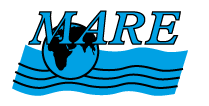Open Letter to Next Generation Science Standards Lead State Teams
Achieve, Inc. is developing Next Generation Science Standards (NGSS) based on “A Framework for K-12 Science Education,” the guiding document developed by the National Research Council. The first draft of the NGSS will be released for public review and comment in March 2012. The following is an open letter to anyone in the MARE Community who might participate in that revew, from the Ocean Literacy Campaign, a “NGSS Critical Stakeholder" that is led by COSEE and the National Marine Educators Association.
To Whom It May Concern,
Achieve, Inc. will release a draft of the Next Generation Science Standards this March for public review and comments. We are contacting you on behalf of the Ocean Literacy Campaign to let you know that the Next Generation Science Standards (NGSS) represent an historic opportunity to advance the goal of improving public understanding of the vital role the ocean plays in all our lives. This is a matter of great economic, social and scientific importance to all Americans. Hundreds of scientists and educators nationwide have joined together in the Ocean Literacy Campaign to ensure that ocean concepts are part of the Next Generation Science Standards (NGSS). On January 12, 2012, President Obama released a draft implementation plan for his Administration's National Policy for the Stewardship of the Ocean, Our Coasts and the Great Lakes that lists a milestone, “Include ocean content in Next Generation Science Standards.” We hope that you will join this national effort.
We have a powerful opportunity to ensure that every child gains a broad understanding of the importance of the ocean, especially its influences on the economy, climate, biodiversity, our food sources, and to the overall quality of our lives. Including ocean sciences in the NGSS is the single most important action that can be taken to alert the public to the importance of keeping our ocean healthy.
Because of active, coordinated involvement by the Ocean Literacy Campaign during the review and comment period for NRC’s A Framework for K-12 Science Education, that document includes an unprecedented treatment of ocean sciences. We now ask that you play an active role in ensuring that critical scientific information about the ocean is included in the final version of the standards themselves.
We hope that you will look specifically for ocean sciences concepts as you review drafts of the NGSS. The Ocean Literacy Campaign is not seeking to add more “ocean standards.” The goal of this effort is to adjust the core disciplinary ideas in NGSS so that they reflect the true complexity of the natural world, including the tremendous influence of the ocean on living things, Earth systems, and Earth processes. This inclusion and adjustment of language can occur in a variety of ways; for instance:
- There are aspects of life in the ocean and of ocean processes that are quite unique and unlike their counterparts on land and in the atmosphere. There often appears to be a default assumption that science exists exclusively in a terrestrial environment.
- In some cases, using ocean examples can simply provide a more full understanding of a complex concept; in other cases, the omission of ocean examples can lead to misconceptions or even factual incorrectness, e.g., referring to “organisms” as “plants, animals and microorganisms” might lead learners to ignore the important ecological role of macro-algae or to think that algae are plants, or worse yet, to never know that algae exist.
- Similarly, referring to only photosynthesis when discussing primary productivity denies learners the opportunity to understand the critical global ecological importance of chemosynthesis in deep sea hydro-thermal vents.
- While considerable attention is finally and rightfully being placed nationwide on understanding the causes and consequences of climate change, we have observed that many climate change education efforts have ignored the critical importance of the influence of the ocean on the climate, and vice-versa, the influence of the changing climate on the ocean.
To assist you in this challenging task, we refer you to community generated materials developed by the Ocean Literacy Campaign as resources. These include Ocean Literacy: The Essential Principles of Ocean Sciences K-12 and the Ocean Literacy Scope and Sequence for Grades K-12. You can find these resources at www.oceanliteracy.net.
We hope that you will play an active role in ensuring that the NGSS make it clear that students cannot be considered science literate without being Ocean Literate.
Please let us know if you would like any additional information to assist with your review.
Sincerely yours,
Craig Strang, Lawrence Hall of Science, COSEE CA, NMEA President-Elect
Arthur Eisenkraft, University of Massachusetts, Boston, COSEE OCEAN
Carmelina Livingston, Albert Einstein Fellow at the National Science Foundation, COSEE SE, NMEA Board
Diana Payne, Connecticut Sea Grant, COSEE TECH, NMEA President
Cheryl Peach, Scripps Institution of Oceanography, COSEE California
Sarah Schoedinger, NOAA Office of Education, COSEE Council Ex-officio, NMEA Past-President
Lynn Tran, Lawrence Hall of Science, COSEE California
Peter Tuddenham, College of Exploration, COSEE CA and COSEE West
Lynn Whitley, USC Sea Grant, COSEE West, NMEA Past-President
On behalf of COSEE and NMEA for the Ocean Literacy Campaign
(www.oceanliteracy.net)




